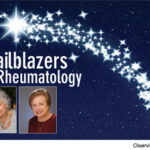
Dragon Images/shutterstock.com
WASHINGTON, D.C.—Paulette Hahn, MD, associate professor of medicine specializing in rheumatology at the University of Florida (UF), said she once treated a patient named Monica, a UF undergraduate who had severe inflammatory muscle disease and severe lung disease.
The patient’s disease was under control for the time being, but Monica knew she could take a turn for the worse at any time. For that reason, she was sure to stay ahead in her coursework. Dr. Hahn got to know Monica well and came to admire her “incredible joy for life.”
When Monica came in for a visit one day, she told Dr. Hahn that she’d gone on a tubing trip, taking her oxygen tank with her as she floated down a river. Going by the book, this might have come as horrifying news to Dr. Hahn, and indeed, she said her reaction was to think, What in the world? and worry about what could have gone wrong.
But she kept that reaction to herself.
“Out loud, I said, ‘You go for it; that is fantastic.’” She knew Monica as a person, not just as a patient, and knew how important the trip must have been for her. Monica died before graduating, but Dr. Hahn advocated for a diploma, which was given to her family.
Treat the Whole Person
The role of the humanities—getting to know and treating a person as a whole, rather than just with medication and treatment strategies—should be more prominent in medicine, said Dr. Hahn during the ARHP keynote session at the 2016 ACR/ARHP Annual Meeting. Combining humanity with clinical care results in more compassionate and more effective patient care and more fulfilling work for physicians, Dr. Hahn said.
“The humanities are truly concerned about the science of the human,” she said. “It helps us engage; it helps us think; it helps us ask questions and be curious.”
Melding humanities and medicine, or health humanities (a term that Dr. Hahn prefers), involves four main factors: compassion, curiosity, collaboration and creativity.
These factors can be particularly useful in rheumatology, a field that often requires a deeper bond between patients and physicians. Dr. Hahn reminded the audience that rheumatologists often focus on the hands—which are so important to human connection—and that rheumatologists often need to “see things that others may not see, even when they look.”
Rather than thinking strictly medically, she encouraged the audience to think of their care as part of the health humanities, which provides a kind of universal language for inter-professionalism and collaboration. Rather than “patient-centered” care, she said, it would be better to consider the patient as having a seat at the table, so to speak, participating in a collaborative care process with the physician.
The Importance of Play
Dr. Hahn also emphasized the idea that play shouldn’t be seen as the opposite of work.
